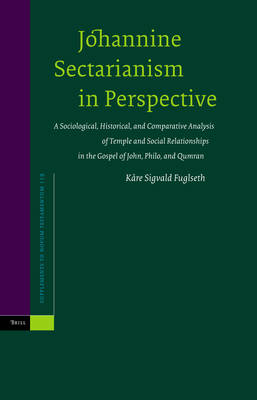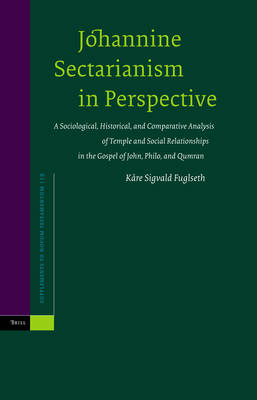
- Afhalen na 1 uur in een winkel met voorraad
- Gratis thuislevering in België vanaf € 30
- Ruim aanbod met 7 miljoen producten
- Afhalen na 1 uur in een winkel met voorraad
- Gratis thuislevering in België vanaf € 30
- Ruim aanbod met 7 miljoen producten
Zoeken
Johannine Sectarianism in Perspective
A Sociological, Historical, and Comparative Analysis of Temple and Social Relationships in the Gospel of John, Philo and Qumran
Kåre Sigvald Fuglseth
€ 277,95
+ 555 punten
Omschrijving
The central aim of the investigation is to evaluate the claim that the Gospel of John was a product of a 'sectarian' milieu.
Fuglseth is using methods primarily derived from sociology and the study of new religious movements today. He discusses in particular the 'cult'-model as an alternative to 'sect, ' and compares the Johannine texts with texts from two contemporary milieus: Philo and the Dead Sea Scrolls. The thesis is embedded in a comprehensive survey of research and discussions of methods and of the existence of a Johannine community.
There are still serious debates going on about the existence and nature of the Johannine group, its 'Jewish' roots and settings, the attitude to the 'Jews' and the 'synagogue', and the two levels of meanings in the Johannine text according to Martyn and Brown. In this situation Fuglseth's investigation is of great current interest and gives new answers to central questions in the Johannine research.
Fuglseth is using methods primarily derived from sociology and the study of new religious movements today. He discusses in particular the 'cult'-model as an alternative to 'sect, ' and compares the Johannine texts with texts from two contemporary milieus: Philo and the Dead Sea Scrolls. The thesis is embedded in a comprehensive survey of research and discussions of methods and of the existence of a Johannine community.
There are still serious debates going on about the existence and nature of the Johannine group, its 'Jewish' roots and settings, the attitude to the 'Jews' and the 'synagogue', and the two levels of meanings in the Johannine text according to Martyn and Brown. In this situation Fuglseth's investigation is of great current interest and gives new answers to central questions in the Johannine research.
Specificaties
Betrokkenen
- Auteur(s):
- Uitgeverij:
Inhoud
- Aantal bladzijden:
- 464
- Taal:
- Engels
- Reeks:
- Reeksnummer:
- nr. 119
Eigenschappen
- Productcode (EAN):
- 9789004144118
- Verschijningsdatum:
- 15/09/2005
- Uitvoering:
- Hardcover
- Formaat:
- Genaaid
- Afmetingen:
- 164 mm x 244 mm
- Gewicht:
- 975 g

Alleen bij Standaard Boekhandel
+ 555 punten op je klantenkaart van Standaard Boekhandel
Beoordelingen
We publiceren alleen reviews die voldoen aan de voorwaarden voor reviews. Bekijk onze voorwaarden voor reviews.








